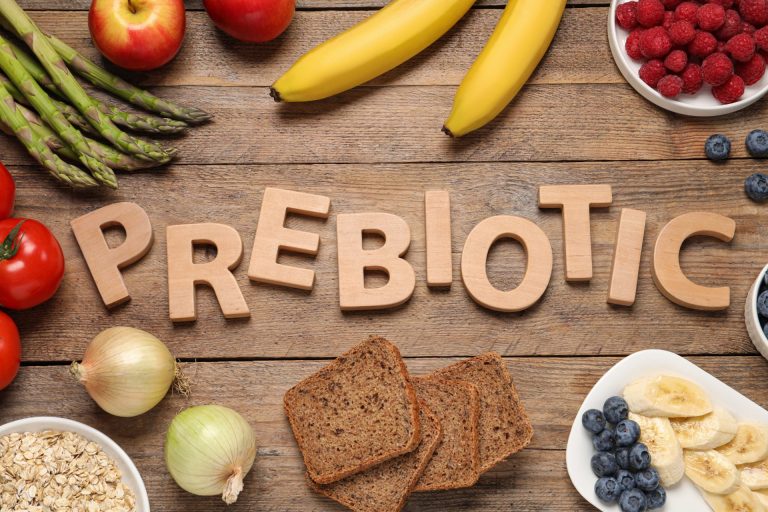Imagine a hidden world inside you, teeming with trillions of tiny creatures – a universe known as the gut microbiome. These microbial residents play a crucial role in your overall health, influencing everything from digestion and immunity to mood and even weight management. But just like any ecosystem, your gut needs the right nourishment to flourish. Enter prebiotics, the unsung heroes that fuel the good bacteria within, promoting a happy and healthy gut.
What Exactly Are Prebiotics?
Prebiotics aren’t alive, but they are the lifeblood of your gut’s beneficial bacteria. Think of them as fertilizer for your internal garden. These special types of fibre, resistant to digestion by your body, travel intact to your large intestine. There, they become a feast for the good bacteria, stimulating their growth and activity.
Here’s the magic that unfolds: as these friendly microbes ferment prebiotics, they produce short-chain fatty acids (SCFAs). These SCFAs are like superpowers for your gut and overall health. They:
Nourish your colon cells: SCFAs act as a primary fuel source for the cells lining your colon, keeping them healthy and functioning optimally.
Reduce inflammation: Prebiotics promote the production of anti-inflammatory compounds, helping to combat gut issues like inflammatory bowel disease (IBD).
Boost immunity: A healthy gut microbiome is a strong defense system. Prebiotics can help strengthen your immune response by supporting the good bacteria that fight off harmful pathogens.
Improve digestion: By promoting a balanced gut flora, prebiotics can aid digestion, reducing issues like constipation and diarrhea.
Enhance mood and mental well-being: The gut-brain connection is real! Prebiotics may influence the production of mood-regulating neurotransmitters, potentially improving mental health.
Why Should You Be Embracing Prebiotics?
In today’s fast-paced world, our diets often lack the diversity and fiber content needed for a thriving gut microbiome. Processed foods, sugary treats, and excessive stress can all disrupt the delicate balance of gut bacteria. This imbalance, known as dysbiosis, has been linked to various health concerns. Prebiotics can be your secret weapon to restore balance and unlock a multitude of health benefits:
Improved Digestive Health: Say goodbye to bloating, gas, and constipation! Prebiotics can promote regularity and overall digestive comfort.
Enhanced Nutrient Absorption: A healthy gut microbiome aids in the absorption of essential vitamins and minerals from your food, optimizing your nutritional health.
Stronger Immune System: By supporting the good bacteria that fight off bad actors, prebiotics can help keep you healthy and ward off illness.
Reduced Risk of Chronic Disease: Research suggests that prebiotics may play a role in preventing chronic conditions like obesity, type 2 diabetes, and even certain cancers.
Weight Management: Prebiotics can promote feelings of satiety and fullness, potentially aiding in weight management efforts.
Better Mood and Mental Clarity: The gut-brain connection is a powerful one. Prebiotics may influence mood-regulating neurotransmitters, potentially leading to improved mental well-being and cognitive function.
Unveiling the Powerhouse Prebiotic Foods:
The good news is that incorporating prebiotics into your diet is easy and delicious! Here are some prebiotic superstars you can add to your plate:
- Fruits and Vegetables: Reach for fruits like bananas, berries, apples, and artichokes. Vegetables like onions, garlic, asparagus, and leafy greens are also excellent sources.
- Whole Grains: Opt for whole grains like oats, brown rice, quinoa, and barley. These provide both fiber and prebiotics.
- Legumes: Beans, lentils, and chickpeas are not only protein powerhouses but also prebiotic champions.
- Nuts and Seeds: Almonds, cashews, flaxseeds, and chia seeds are packed with prebiotic fiber.
- Fermented Foods: Sauerkraut, kimchi, yogurt with live cultures, and kefir are loaded with beneficial bacteria and prebiotics.
Probiotics vs. Prebiotics: Understanding the Difference.
While both probiotics and prebiotics are essential for gut health, they play distinct roles. Here’s a quick breakdown:
- Probiotics: Live bacteria found in fermented foods and supplements. They directly introduce good bacteria into your gut.
Prebiotics: Non-digestible fibers that act as food for your existing good bacteria, promoting their growth and activity.
Prebiotics: The Future of Gut Health
Prebiotics are a powerful tool for nurturing a healthy gut microbiome, with potential benefits for various aspects of your well-being. By incorporating prebiotic-rich foods into your diet, you can empower your gut bacteria to thrive and unlock a world of health benefits. Remember, a healthy gut is a happy gut, and a happy gut contributes to a happier, healthier you!
Hurry up! Get 25% off now for a limited time offer.




